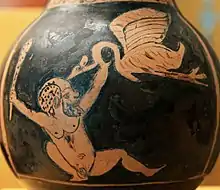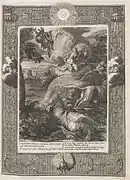| Gerana | |
|---|---|
 A Pygmy fights a crane, Attic red-figure chous, ca. 430–420 BC, National Archaeological Museum of Spain. | |
| In-universe information | |
| Alias | Oenoe |
| Species | Human, then crane |
| Gender | Female |
| Title | Queen |
| Significant other | Nicodamas |
| Children | Mopsus, a tortoise |
| Birthplace | Africa |
Gerana,[lower-alpha 1] sometimes also called Oenoe,[lower-alpha 2] is a queen of the Pygmy folk in Greek mythology, who incurred the wrath of the goddess Hera and was subsequently turned into a bird bearing her name, the crane.[lower-alpha 3][1] This aetiological tale explains the ancient rivalry between the Pygmies and the cranes, and also serves as a cautionary tale against the people who hubristically claimed to be better than even the gods themselves. Gerana's story bears some resemblance to that of Lamia, who was also a beautiful woman cursed by Hera and transformed into something unappealing.
Etymology
Γεράνα is a modified spelling of γέρανος, which is the Ancient Greek word for crane.[2] It derives from the Proto-Indo-European root *gerh2-en-/-eu-, meaning the same thing; cognate with the English word 'crane.'[3] It seems to be attested in Mycenaean Greek in the dative plural form gerenai (Linear B: 𐀐𐀩𐀙𐀂, ke-re-na-i), though Beekes expressed some doubt over it.[3]
Mythology
According to Antoninus Liberalis, who attributes the story to the Hellenistic writer Boeus,[4] she was born to the Pygmies, a very beautiful but graceless girl who shunned the worship of Hera and Artemis.[5][6] She married Nicodamas, who unlike her was good and sensible, and had a son by him, Mopsus. The other Pygmies brought many gifts for the newborn infant, but Hera, enraged that Gerana would not worship her, elongated her neck and turned her into a crane. Wishing to keep close to her child, Gerana as a crane would fly from roof to roof, but the people armed themselves and chased her away, and thus rose the rivalry between the Pygmies and cranes.[7][8] Athenaeus, who also quotes Boeus in his Deipnosophistae, says that according to him Gerana was worshipped as a goddess by her people, while she herself only had contempt for goddesses like Artemis and Hera, so Hera turned her into a crane, a bird considered ugly, and further made the Pygmies hate cranes. Apparently he also wrote that Gerana and Nicodamas became the parents of a tortoise.[9]

Gerana and her fate was woven by the goddess Athena in her tapestry during her weaving contest with the Lydian Arachne, as a warning against the girl about the fate of those who dare to compare themselves to the gods. Ovid says that Gerana saw herself as equal to the Heavens, so Hera turned her into a crane after besting her in some contest and forced her to wage war against her own people; perhaps Gerana boasted of being more beautiful than the queen of gods.[10]
Antoninus Liberalis calls this woman Oenoe,[7][11] (meaning 'wine-y'[12]) while Ovid does not give her a name at all; it is Athenaeus and Aelian, a third century AD author, who call her Gerana. Aelian says that the Pygmies worshipped their beautiful queen Gerana as a goddess, paying her honours above a those fit for a human.[6] Gerana claimed to surpass Hera, Artemis, Athena and Aphrodite all in beauty, so Hera transformed her into a hideous crane.[13] Eustathius, a Byzantine scholar, repeats the same tale in brief.[14] It is possible that all three variations of Gerana's story can be traced all the way back to the Ornithogony ("birth of the birds") by the Hellenistic writer Boeus.[15]
The first lines in the third book of the Iliad implies that this tale, or at least a version of it, might had been known as early as Homer (eighth century BC).[16][17] According to Russian philologist Irina V. Shtal an earlier–now lost–epic poem called the Geranomachia ("battle against the cranes"), one of the many light-hearted parodies of the Iliad written in ancient times,[18] was erroneously attributed to Homer in antiquity.[19]
Joseph Fontenrose in turn identifies Gerana with Lamia, another mythological woman punished by Hera and turned into a hideous beast. Fontenrose notes that they are both beautiful queens connected to Africa who enrage Hera, undergo transformation as punishment at her hands and are deprived of their children.[20][21]
See also
Footnotes
- ↑ Ancient Greek: Γεράνα, romanized: Gerána, lit. 'she-crane' pronounced [gerána].
- ↑ Ancient Greek: Οἰνόη, romanized: Oinóē, lit. 'wine-ish' pronounced [oi̯nóɛː].
- ↑ Ancient Greek: γέρανος, romanized: géranos pronounced [géranos].
Notes
- ↑ Grimal 1987, s.v. Gerana.
- ↑ Liddell & Scott s.v. γέρανος
- 1 2 Beekes 2009, p. 267.
- ↑ Smith 1873, s.v. Gerana.
- ↑ M. Rosemary Wright. "A Dictionary of Classical Mythology: Summary of Transformations". mythandreligion.upatras.gr. University of Patras. Retrieved January 3, 2023.
- 1 2 Forbes Irving 1990, p. 22.
- 1 2 Antoninus Liberalis, Metamorphoses 16
- ↑ Celoria 1992, p. 16.
- ↑ Athenaeus 2008, 9.393.c.
- ↑ Ovid, Metamorphoses 6.89–91
- ↑ Smith 1873, s.v. Oenoe 1.
- ↑ Celoria 1992, p. 81.
- ↑ Aelian 1959, 15.29.
- ↑ Eustathius s.v. Γεράνα
- ↑ Zingg, Reto (2006). Cancik, Hubert; Schneider, Helmuth (eds.). Translated by Christine F. Salazar. "Gerana". www.referenceworks-brillonline-com/subjects. Basle. doi:10.1163/1574-9347_bnp_e422220. Retrieved 24 April 2023.
- ↑ Homer, Iliad 3.1-3.6
- ↑ Bell 1991, s.v. Gerana.
- ↑ Theodorakopoulos 1972, p. 414.
- ↑ Shtal 1989, p. 304.
- ↑ Fontenrose 1959, pp. 100-101.
- ↑ Fontenrose 1959, p. 286.
References
- Aelian (1959). On Animals. Loeb Classical Library 449. Vol. III: Books 12-17. Translated by by A. F. Scholfield. Cambridge, MA: Harvard University Press. ISBN 9780674994942.
- Antoninus Liberalis, The Metamorphoses of Antoninus Liberalis translated by Francis Celoria (Routledge 1992). Online version at the Topos Text Project.
- Athenaeus (2008). The Learned Banqueters. Loeb Classical Library 235. Vol. IV: Books 8-10.420e. Translated by S. Douglas Olson. Cambridge, MA.: Harvard University Press. ISBN 9780674996267.
- Beekes, Robert S. P. (2009). Lucien van Beek (ed.). Etymological Dictionary of Greek. Leiden Indo-European Etymological Dictionary Series. Vol. 1. Leiden, the Netherlands: Brill Publications. ISBN 978-90-04-17420-7.
- Bell, Robert E. (1991). Women of Classical Mythology: A Biographical Dictionary. ABC-Clio. ISBN 9780874365818.
- Celoria, Francis (October 24, 1992). The Metamorphoses of Antoninus Liberalis: A Translation with a Commentary'. USA, Canada: Routledge. ISBN 0-415-06896-7.
- Eustathius (1825). Eustathii archiepiscopi Thessalonicensis Commentarii ad Homeri. Vol. 1–2. Weigel.
- Fontenrose, Joseph Eddy (1959). Python: A Study of Delphic Myth and Its Origins. California, England: University of California Press. ISBN 0-520-04091-0.
- Forbes Irving, Paul M. C. (1990). Metamorphosis in Greek Myths. Oxford Classical Monographs. Oxford, New York, Toronto: Oxford University Press, Clarendon Press. ISBN 0-19-814730-9.
- Grimal, Pierre (1987). The Dictionary of Classical Mythology. Translated by A. R. Maxwell-Hyslop. New York, USA: Wiley-Blackwell. ISBN 0-631-13209-0.
- Homer (1924). The Iliad. Translated by A.T. Murray, Ph.D. Cambridge, MA., London: Harvard University Press, William Heinemann, Ltd. Online version at Perseus.tufts Library.
- Liddell, Henry George; Scott, Robert (1940). A Greek-English Lexicon, revised and augmented throughout by Sir Henry Stuart Jones with the assistance of Roderick McKenzie. Oxford: Clarendon Press. Online version at Perseus.tufts Library.
- Ovid (1922). Metamorphoses. Translated by Brookes More. Boston: Cornhill Publishing Co. Online version at the Perseus Digital Library.
- Shtal, Irina Vladimirova (1989). Эпические предания Древней Греции: Гераномахия. Опыт типологической и жанровой реконструкции [Epic legends of Ancient Greece: Geranomachia. Experience of Typological and Genre Reconstruction] (in Russian). Moscow, Russia: Nauka.
- Smith, William (1873). A Dictionary of Greek and Roman Biography and Mythology. London: Taylor, Walton, and Maberly. Online version at Perseus.tufts Library.
- Theodorakopoulos, Ioannes (1972). Νέα Ελληνική Εγκυκλοπαίδεια [New Greek Encyclopedia] (in Greek). Vol. 9. Athens, Greece: «Χάρη Πάτση».
External links
- PYGMIES on the Theoi Project
 The dictionary definition of γέρανος at Wiktionary
The dictionary definition of γέρανος at Wiktionary
.jpg.webp)
.jpg.webp)
